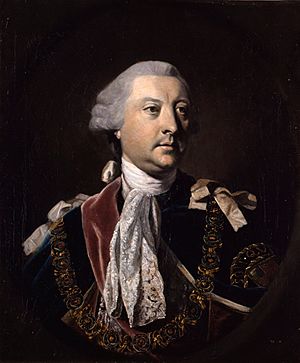George Montagu-Dunk, 2nd Earl of Halifax facts for kids
Quick facts for kids
The Earl of Halifax
|
|
|---|---|

Portrait by Joshua Reynolds, 1764
|
|
| Lord Privy Seal | |
| In office 26 February 1770 – 22 January 1771 |
|
| Monarch | George III |
| Prime Minister | Lord North |
| Preceded by | The Earl of Bristol |
| Succeeded by | The Earl of Suffolk |
| Lord Lieutenant of Ireland | |
| In office 3 April 1761 – 27 April 1763 |
|
| Monarch | George III |
| Preceded by | The Duke of Bedford |
| Succeeded by | The Earl of Northumberland |
| President of the Board of Trade | |
| In office 1 November 1748 – 21 March 1761 |
|
| Monarch | George II |
| Preceded by | The Lord Monson |
| Succeeded by | The Lord Sandys |
| Personal details | |
| Born | 6 October 1716 |
| Died | 8 June 1771 (aged 54) |
| Nationality | British |
| Political party | Tory |
| Alma mater | Trinity College, Cambridge |
George Montagu-Dunk, 2nd Earl of Halifax (born October 6, 1716 – died June 8, 1771) was an important British politician during the Georgian era. He was known for helping trade grow in the Americas. Because of this, some people called him the "father of the colonies."
From 1748 to 1761, he was the President of the Board of Trade. In this role, he helped start Nova Scotia in 1749. The capital city, Halifax, was even named after him. After the Treaty of Paris of 1763, when Canada became part of Great Britain, he helped define its borders. He also renamed it the "Province of Quebec."
Contents
Early Life and Family
George Montagu-Dunk was the son of the 1st Earl of Halifax. Before he became Earl of Halifax in 1739, he was known as Viscount Sunbury. People often called him Lord Halifax.
He went to school at Eton College and Trinity College, Cambridge. In 1741, he married Anne Richards. She had inherited a lot of money from Sir Thomas Dunk. George Montagu-Dunk then added "Dunk" to his name.
His Career in Government
George Montagu-Dunk held many important jobs in the British government. He started as an official for Frederick, Prince of Wales. Later, he became the Master of the Buckhounds.
In 1748, he became the President of the Board of Trade. This was a very important role for him. He helped establish Halifax, the capital of Nova Scotia. This city was named in his honor. He also worked to improve trade, especially with North America.
He tried to become a Secretary of State but was not successful at first. In 1757, he was finally allowed to join the Cabinet. In 1761, Halifax became the Lord Lieutenant of Ireland. For some of this time, he was also the First Lord of the Admiralty.
In 1762, he became the Secretary of State for the Northern Department. The next year, he moved to the Secretary of State for the Southern Department. During the time George Grenville was Prime Minister, King George III trusted Halifax as one of his main advisors.
Halifax left his government roles in July 1765. But he returned to the Cabinet in January 1770. He became the Lord Privy Seal under his nephew, Lord North. He had just been given his old job as Secretary of State again when he passed away.
George Montagu-Dunk and Cricket
Like his friends John Russell, 4th Duke of Bedford and John Montagu, 4th Earl of Sandwich, Halifax enjoyed the sport of cricket. The first time we know he played was in 1741. He led the Northamptonshire team in a match. They played against Buckinghamshire in Northampton.
In the same year, Halifax and Sandwich created a team called Northamptonshire & Huntingdonshire. This team beat Bedfordshire twice.
His Legacy
Views on Society and Politics
Halifax was a Lieutenant General and also the Lord-Lieutenant of Northamptonshire. He was known for spending a lot of money.
He was against slavery. He made sure not to invest his money in anything connected to the slave trade. He often supported the colonists in North America when they had disagreements with the British Parliament. This made him a popular figure in places like the Province of Massachusetts Bay and the Colony of Virginia. Halifax also believed that more people in Great Britain should be able to vote in elections.
Memorials and Named Places
George Montagu-Dunk was buried in the church in Horton, Northamptonshire. You can also find a bust and a plaque honoring him in Westminster Abbey. There is an obelisk, which is a tall, thin monument, in Chicksands Wood in Haynes, Bedfordshire, built to remember him.
Many places are named after him. These include the municipality of Halifax and Halifax County, Nova Scotia in Canada. In the United States, the Halifax River in Florida, the town of Halifax and Halifax County, North Carolina, and Halifax, Virginia, are named for him. Dunk Island in Queensland and Montague Island in New South Wales, Australia, also carry names related to him.
Images for kids
-
Horton Hall was Halifax's family home in Northamptonshire.
 | Janet Taylor Pickett |
 | Synthia Saint James |
 | Howardena Pindell |
 | Faith Ringgold |






